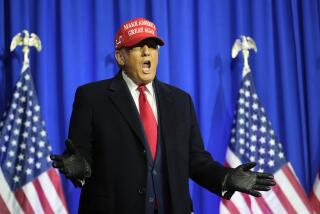Obama takes aim at firms that shift profits overseas to avoid taxes
The Obama administration called out corporate America for its growing use of a tactic to avoid paying taxes and urged lawmakers to act quickly to put a halt to the maneuver.
In a sharply worded letter to key congressional tax code writers, Treasury Secretary Jacob J. Lew pushed for legislation that would make it more difficult for U.S. companies to reorganize as foreign firms in lower-tax nations.
The practice, known as inversion, enables the new company to avoid paying the high U.S. corporate tax rate on its foreign earnings.
“What we need as a nation is a new sense of economic patriotism where we all rise and fall together,” Lew wrote in the letter to lawmakers. “We should not be providing support for corporations that seek to shift their profits overseas to avoid paying their fair share of taxes.”
Inversions have become more common in recent years as other nation’s have cut their corporate tax rates.
The 35% rate in the U.S. now is the highest among major developed economies, and domestic multinational corporations are stashing an estimated $2 trillion abroad to avoid the tax bill facing them if they bring the money home.
Congress, meantime, has been at loggerheads on efforts to overhaul the tax code and reduce the corporate rate.
By buying a foreign company, American firms can reincorporate overseas and have full access to offshore earnings without paying U.S. taxes on money held in foreign countries. Nearly 50 U.S. companies have done so in the last decade.
This week, Mylan Inc. agreed to buy Abbott Laboratories’ generic drug business in developed countries and create a new company that would be incorporated in the Netherlands, where the corporate tax rate is 25%.
Mylan plans to keep its headquarters in Canonsburg, Pa., just southwest of Pittsburgh.
Walgreen Co. reportedly is considering a similar offshore tax shift by purchasing the rest of a Swiss company it partially owns. And pharmaceutical giant Pfizer Inc. had its sights on an inversion when it sought to purchase British drug maker AstraZeneca in May, but the deal fell through.
“In the past, you could count on one hand the significant inversions,” said Kenneth Serwin, director of Berkeley Research Group, a global economic and business consulting firm. “Lew’s letter is a reflection that everyone’s seeing that trickle may become a stream.”
The high U.S. tax rate isn’t the sole motivation for pursuing a foreign deal, he said. But if an acquisition takes place for other reasons, the tax rate can push executives to reorganize abroad.
Lew said such moves “hollow out the U.S. corporate income tax base” and are unfair to other taxpayers.
“The firms involved in these transactions still expect to benefit from their business location in the United States, with our protection of intellectual property rights, our support for research and development, our investment climate and our infrastructure, all funded by various levels of government,” he wrote.
After Pfizer announced its bid for AstraZeneca, some lawmakers pushed to restrict inversions.
Rep. Sander M. Levin (D-Mich.) led a group of House Democrats in introducing legislation to make the maneuver more difficult. It would require a company to have at least 50% foreign ownership instead of the current 20% in order to be considered foreign for U.S. tax purposes.
The bill and a companion one in the Senate are similar to a proposal in President Obama’s fiscal 2015 budget and would generate an additional $19.5 billion in tax revenue over the next 10 years.
“Ordinary Americans can’t change their address to an overseas location in order to avoid paying taxes,” Levin said in welcoming Lew’s push for action. “We must act now to ensure that big corporations are unable to do just that.”
Lew said the best way to deal with the problem would be to include it in a broad overhaul of the business tax system that also would lower the corporate rate and close loopholes.
Many Republicans, joined by business groups, agree. But a bipartisan push for major tax legislation has stalled in Congress.
Given that, Chris Chocola, president of the fiscally conservative Club for Growth, said Lew’s call for economic patriotism was shameful.
“Companies aren’t taking advantage of inversion because they’re unpatriotic. They’re taking advantage of it because the Obama administration and Congress have failed to pass comprehensive tax reform that would make America a far more attractive place to invest,” he said.
Because of the trouble in advancing a broad overhaul, Lew urged lawmakers to move quickly now “to shut down this abuse of our tax system.”
Chris Krueger, a senior analyst at financial services firm Guggenheim Partners, said there was no chance that Congress would act on the issue this year, with only about 24 legislative days before the November midterm elections.
Republicans are more intent on lowering the U.S. corporate tax rate through an overhaul, and it doesn’t make sense for them to act separately to restrict inversions, he said.
Republicans opposed a recent attempt by House Democrats to include legislation restricting inversions in a highway funding bill.
“I’m not sure Republicans would say this publicly, but the more inversions [that companies] do only builds momentum to get tax reform done,” Krueger said.
If the U.S. rate is lowered and other changes are made to the tax code, the incentive for reorganizing overseas largely would disappear, he said.







